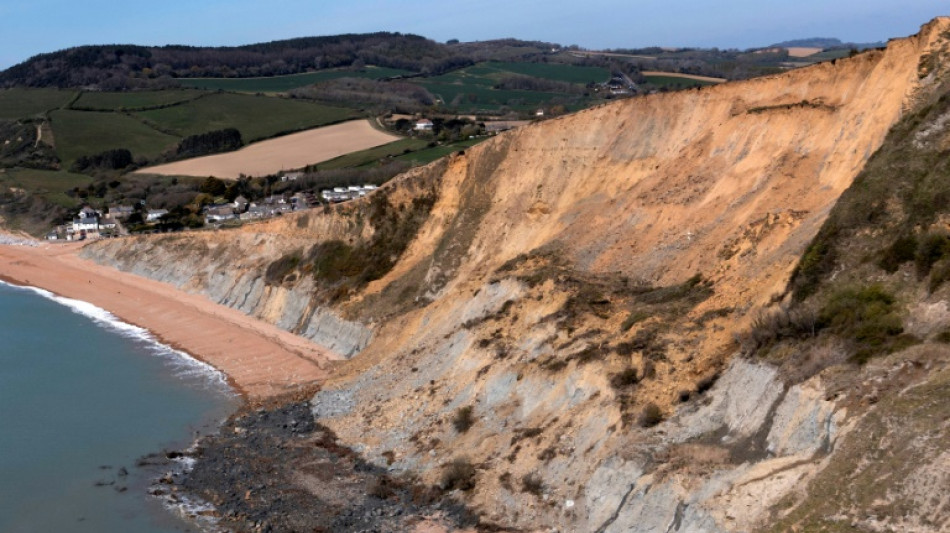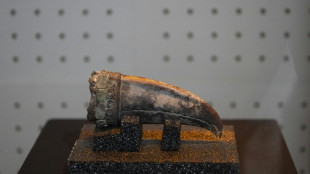
-
 Indian army says new exchange of gunfire with Pakistan
Indian army says new exchange of gunfire with Pakistan
-
Epstein accuser Virginia Giuffre takes own life in Australia: family

-
 Hundreds of buildings damaged, dozens injured in 6.3 Ecuador quake
Hundreds of buildings damaged, dozens injured in 6.3 Ecuador quake
-
India and Pakistan's Kashmir fallout hits economy too

-
 Francis's funeral to be grand farewell to 'pope of the poor'
Francis's funeral to be grand farewell to 'pope of the poor'
-
Pogacar faces defiant Evenepoel at Liege-Bastogne-Liege

-
 Chelsea eye great escape against Barcelona in Women's Champions League
Chelsea eye great escape against Barcelona in Women's Champions League
-
Iran, US to hold new round of high-level nuclear talks

-
 'Energy and effort' pay off for Reds as Blues' woes continue
'Energy and effort' pay off for Reds as Blues' woes continue
-
Albatross and closing birdie lift China's Liu to LPGA Chevron lead

-
 On the horizon? Wave of momentum for high seas treaty
On the horizon? Wave of momentum for high seas treaty
-
Developing countries should fast-track US trade deals: World Bank president

-
 Grizzlies' Morant 'doubtful' for must-win game 4 v Thunder
Grizzlies' Morant 'doubtful' for must-win game 4 v Thunder
-
Trump in Rome for pope funeral in first foreign trip of new term

-
 Trump says Russia-Ukraine deal 'very close' after new Kremlin talks
Trump says Russia-Ukraine deal 'very close' after new Kremlin talks
-
US rookies lead PGA pairs event with McIlroy and Lowry in hunt

-
 Trump tariff promises get a reality check
Trump tariff promises get a reality check
-
Warriors coach Kerr 'relatively optimistic' injured Butler will play game 3

-
 Postecoglou hopes 'Stonecutter's Credo' can inspire Spurs
Postecoglou hopes 'Stonecutter's Credo' can inspire Spurs
-
PSG lose unbeaten Ligue 1 record ahead of Arsenal showdown

-
 Venezuela accuses El Salvador president of 'human trafficking'
Venezuela accuses El Salvador president of 'human trafficking'
-
Own goal takes Sundowns to African final against Pyramids

-
 Scores of buildings damaged, 20 injured in Ecuador quake
Scores of buildings damaged, 20 injured in Ecuador quake
-
US stocks extend rally as market eyes busy calendar next week

-
 Pope's death triggers surge of disinformation he fought against
Pope's death triggers surge of disinformation he fought against
-
Rovanpera takes control of Rally Islas Canarias

-
 Zelensky insists Crimea is Ukrainian as US envoy meets Putin
Zelensky insists Crimea is Ukrainian as US envoy meets Putin
-
Patel and Mendis help Sunrisers beat Kings in Dhoni's 400th T20

-
 Copa del Rey ref statements 'unacceptable': Real Madrid after boycotting final build-up
Copa del Rey ref statements 'unacceptable': Real Madrid after boycotting final build-up
-
Insurance CEO's accused killer pleads not guilty to federal murder charges

-
 FBI arrests Wisconsin judge for shielding undocumented migrant
FBI arrests Wisconsin judge for shielding undocumented migrant
-
Brazil ex-president Collor de Mello jailed for corruption

-
 Zelensky insists Crimea 'belongs' to Ukraine as US envoy meets Putin
Zelensky insists Crimea 'belongs' to Ukraine as US envoy meets Putin
-
Real Madrid boycott Copa del Rey build-up over referee complaints

-
 Trinidad and Tobago votes for parliament, PM, with opposition in lead
Trinidad and Tobago votes for parliament, PM, with opposition in lead
-
IMF chief hails 'constructive' Spring Meetings held under tariff uncertainty

-
 Iran FM Araghchi in Oman ahead of nuclear talks with US
Iran FM Araghchi in Oman ahead of nuclear talks with US
-
Dozens of buildings destroyed, 20 injured in Ecuador quake

-
 Young Barca must 'enjoy' Real Madrid Copa final fight: Flick
Young Barca must 'enjoy' Real Madrid Copa final fight: Flick
-
Pakistan and India border closure separates families

-
 Brazil's Bolsonaro 'stable' after post-surgery setback
Brazil's Bolsonaro 'stable' after post-surgery setback
-
Catholics in secular Cuba hail Francis as 'bridge'

-
 US envoy Witkoff, Putin discuss 'possibility' of direct Russia-Ukraine talks
US envoy Witkoff, Putin discuss 'possibility' of direct Russia-Ukraine talks
-
Community seeks answers after French school knife killing

-
 German prosecutors seek jail terms in VW 'dieselgate' trial
German prosecutors seek jail terms in VW 'dieselgate' trial
-
Sabalenka makes winning start at Madrid Open

-
 EU, US should de-escalate and negotiate trade deal: IMF Europe director
EU, US should de-escalate and negotiate trade deal: IMF Europe director
-
Russia accuses Ukraine of killing general in car bombing

-
 Emery wants FA Cup glory and Champions League berth for Villa
Emery wants FA Cup glory and Champions League berth for Villa
-
Buildings destroyed, one injured in Ecuador quake


Society centred around women in UK during Iron Age: scientists
Scientists analysing 2,000-year-old DNA have revealed that a Celtic society in the southern UK during the Iron Age was centred around women, backing up accounts from Roman historians, a study said Wednesday.
When historians such as Tacitus and Cassius wrote about Rome conquering Britain from around AD 44 to 84, they described women holding positions of power.
These include the famous warrior queen Boudica, who started an uprising against Roman occupation, sacking and burning several cities including Londinium -- which would one day become London. There was also Cartimandua, the 1st-century queen of the Brigantes people in northern England.
Julius Caesar, in his account of the Gallic Wars written more than more than century earlier, also described Celtic women participating in public affairs, exercising political influence -- and having more than one husband.
"When the Romans arrived, they were astonished to find women occupying positions of power," said Miles Russell, an archaeologist at Bournemouth University and co-author of the new study in Nature.
Some had doubted these accounts, suggesting "that the Romans exaggerated the liberties of British women to paint a picture of an untamed society," he told AFP.
"But archaeology, and now genetics, implies women were influential in many spheres of Iron Age life," he said.
"Indeed, it is possible that maternal ancestry was the primary shaper of group identities."
- Men moved on, women stayed put -
For the study, the team of researchers analysed more than 50 genomes extracted from burial sites in the village of Winterborne Kingston in southern England's Dorset county, which was populated before and after the Roman conquest.
Iron Age cemeteries with well-preserved burial sites are rare in Britain, perhaps because the dead were often cremated, stripped of their flesh and organs, or simply "deposited in wetlands", the researchers wrote.
However the Durotriges tribe, which occupied the southern central coastal region of England between 100 BC and AD 100 -- and gave their name to Dorset -- were an exception, burying their dead in cemeteries.
Excavations carried out at these sites since 2009 had already yielded some clues about the high social status women held in the tribe.
The "well-appointed graves across the Dorset Iron Age" containing drinking vessels, mirrors, beads and other goods were all female -- except for one that included a sword, said Russell, who led the excavations.
The DNA analysis showed that most of the people buried at the site were related through their maternal line, going "back to a single woman, who would have lived centuries before", said lead study author Lara Cassidy of Trinity College Dublin.
However there were almost no connections down the paternal line.
"This tells us that husbands moved to join their wives' communities upon marriage, with land potentially passed down through the female line," Cassidy said in a statement.
Societies centred around women -- which ethnographers call a "matrilocality" -- are rare throughout this period of history.
Yet the researchers trawled through previous research and "found signatures of matrilocality in a number of cemeteries across Britain dating to the Middle and Late Iron Age," from around 400 BC onwards, Cassidy said.
"However, it is quite possible this system was also common in the early Iron Age or perhaps even earlier."
P.Silva--AMWN



